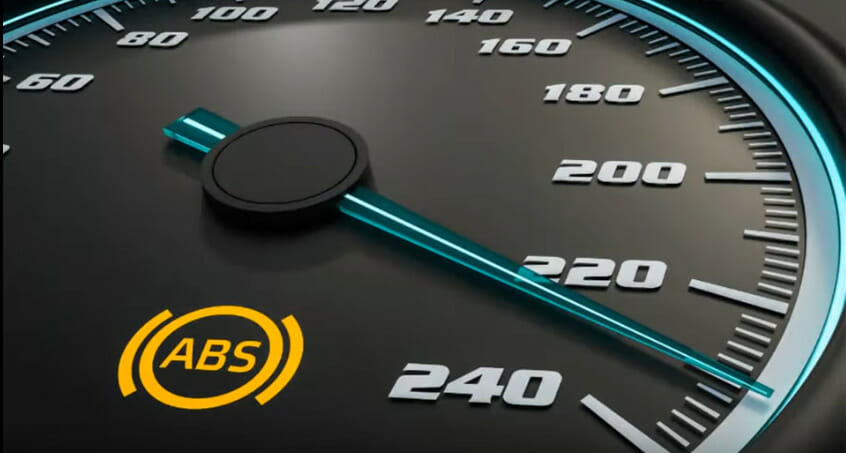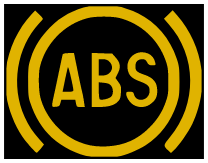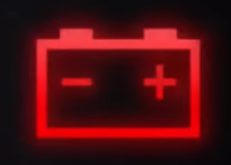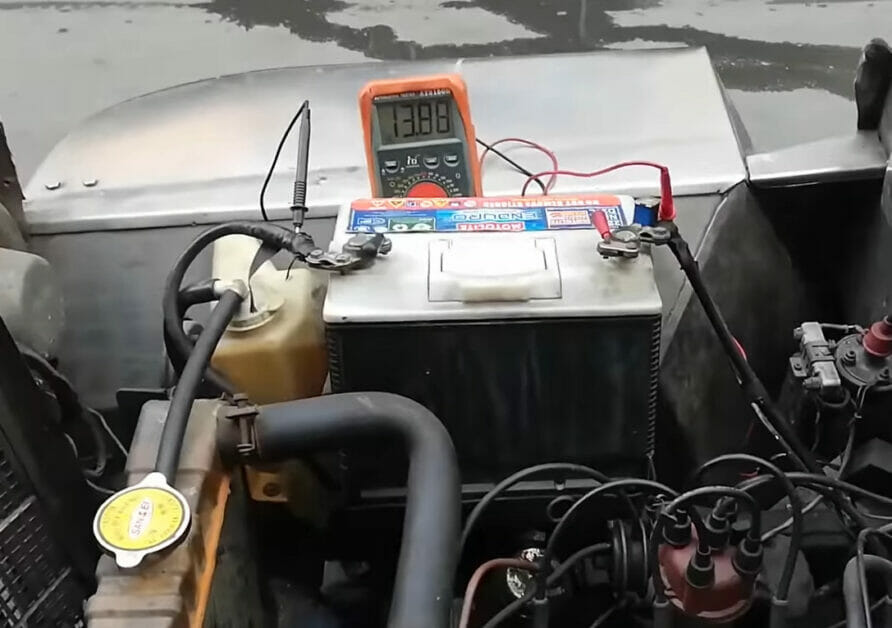Can a Low Battery Cause the ABS Light to Come On?

If you see the ABS light come on, you should know the possible causes.
The ABS (Anti-Lock Braking System) is among the systems the car’s sensors check continuously to ensure they all function normally. If the ABS light comes on, it indicates something is wrong with the ABS. You should check before driving, but it might not necessarily be the ABS at fault. Can it be the battery?
A low or weak battery can cause the ABS light to come on. It’s not a common cause of the ABS light coming on, but it can happen. The ABS has an electrical side responsible for sensing, monitoring, and signaling. A low battery could interrupt this part of the system but not the mechanical operation of the ABS.
I will show you why this might be so, how to tell if it’s the battery at fault, and what to do about it.
When the ABS Light Comes On

The ABS light coming on is not a sign that you should ignore.
It could be due to a problem with the ABS itself, but that’s not necessarily the case. Instead, It could be due to a problem with something related to the ABS. A low or weak battery is one possible cause that you should suspect.
The ABS monitors each wheel’s rotational speed to ensure the car is always stable and controllable. If any of the two or four ABS sensors detect an abnormal or missing signal, the ABS light will come on.
What To Do
When the ABS light comes on, don’t simply turn it off.
The light will automatically come back on again whenever you start the car. You will have to investigate to find the cause and do something about it. The likely causes are:
- A problem with one of the wheels
- A problem with one of the ABS sensors
- A problem with the brake pedal
- Low brake fluid
- A blown fuse
- A defect inside the ABS module
A low battery is not a common cause of the ABS light coming on, but it’s another possible cause, as is a bad alternator or voltage regulator.
Put more brake fluid in the car if you see that its level is low, or replace the ABS fuse if you see that it is blown (but be warned that it might blow again if there’s another issue). If it’s some other fault other than the ABS, take your car to a mechanic to have it checked.
If you notice that the ABS light flashes a few times before staying on permanently, check your vehicle owner’s manual to know what the code means.
If the fault is a weak battery, continue reading to know how to confirm this and what to do about it.
When to Suspect the Battery

The first thing that may come to mind when seeing the ABS light is to suspect the ABS.
If you’ve checked all the items in the above list, which include the brake fluid and fuse, or you notice the battery light comes on, too, it’s time to suspect the battery.
A weak battery is another possible suspect if you’ve ruled out the ABS.
How a Weak Battery Affects the ABS

You might wonder how a weak battery affects the ABS, as the two are separate systems.
The ABS depends on electricity to operate. It relies on a constant power supply for sensing, monitoring, and signaling tasks. Any interruption in this could cause the ABS light to come on. Also, although the hydraulic brake systems remain similar, solenoid valves are used to help modulate brake pressure. [Borgeest, 2018, p.32]
Non-electronic ABS were common, but ABS systems since the late 1980s have been electronic. So, low battery power can affect the ABS’s electrical component, even if the hydraulic brake system remains functional. Insufficient voltage can make it fail to operate normally.
The main electrical components of the ABS that rely on electricity are [Pickerill, 2019]:
- Wheel sensors
- Electronic controller (EBCM) – the computer for the ABS
- Power supply regulator for the microprocessor – The voltage is typically 1.5 volts.
- Wiring
- PM generator – A magnetic reluctance sensor that produces a voltage proportional to the wheel’s speed.
- Brake switch
- ABS warning light
The electronic controller in some electronic ABS systems also has more advanced functions. They are designed to monitor vehicular and pedestrian traffic and other environmental obstacles to help prevent a collision. This makes it even more dependent on the battery for constant and sufficient power. They are called Active Braking Systems.
However, it’s also possible for a low battery to accidentally turn on the ABS light even when the ABS’s electrical component is getting adequate power. A low battery might not affect the brake system significantly, but it’s technically possible to make the ABS malfunction.
Regardless, you should check if the ABS light illuminates the ABS and battery.
A Low Battery
How to Tell if the Battery is Low
A low or weak battery will also have other noticeable effects on the vehicle.
Other accessories may not function optimally or at all. For instance, you may notice the headlights or other internal lights are not as bright as they should be. Or, the headlights might flicker frequently.
If it’s very weak, some accessories, such as the radio or AC, will not work properly, or you may experience problems cranking the engine to start your car.
A low battery may also not provide adequate power to the car’s ECU. Check the battery if other warning lights also come on or come on randomly and intermittently.
What to Do with a Low Battery
A low or weak battery must be recharged, but if it remains weak or weakens quickly, you should replace it, but check its terminals first.
Corrosion on the battery’s terminals can also cause the voltage to drop. Ensure the terminals are always clean. Apply grease or petroleum jelly to hinder the buildup of corrosion again.
Also, ensure that the cable makes secure contact with them.
Proper confirmation of a low battery requires testing its voltage. Use a voltmeter or multimeter to check the voltage across the battery’s terminals. Connect the red cable to the battery’s positive (+) terminal and the black cable to its negative (-) terminal.
The voltage level should not be less than approximately 12.0-12.5 volts when the engine is off. Within this range, the battery has about 25-50% charge, which is low but not too low. If it’s above 12.6 volts, the battery has at least 70% charge, which is good.
The voltage level should be within the range of 13.5 and 14.5 volts while the engine runs. If so, it indicates a healthy battery. Otherwise, check the voltage regulator and alternator, as they might not charge the battery properly.

A typical flooded lead-acid battery can only provide adequate power for about 2 to 3 years. If it’s getting close to 4 or 5 years or you notice any sign of damage, replace it.
FAQs
My car’s battery is fine, but the ABS light is still on. Can I continue driving?
If it’s a minor issue that causes the ABS light to come on, it might be safe to continue driving, but how would you know it’s a minor or major issue without investigating?
If you can brake normally, that’s good, but it’s not something to ignore if the brake warning light also comes on. You shouldn’t drive the car until the entire ABS and braking systems are checked.
In short, don’t take the risk. Stop the car and call for help. Only drive (extra carefully) if you’re sure the braking system is working normally, and go to the nearest car repair shop.
Can a loose battery terminal cause the ABS light to come on?
Yes, a loose battery terminal can interrupt the power to the ABS, causing the light to come on. Ensure the cable is securely attached to both terminals.
Can I reset the ABS light by disconnecting and reconnecting the battery?
Yes, you can reset the ABS light by disconnecting and reconnecting the battery if you leave the battery disconnected for at least 10 to 15 minutes.
But the ABS warning light can still return later if an underlying issue hasn’t been dealt with. If that happens, you should investigate the cause instead of resetting the light this way again.
References
ABS warning light. https://commons.wikimedia.org/wiki/File:B05_Anti-lock_brake_system_malfunction.svg
William B. Ribbens. Understanding automotive electronics: An engineering perspective. 8th edition. 2017
Kai Borgeest. EMC and functional safety of automotive electronics. The Institution of Engineering and Technology. 2018
Ken Pickerill. Today’s technician: Automotive brake systems, classroom manual. Cengage Learning. 2019
Video References
Kansow Vehicle Engineering
Jeep Doctor

